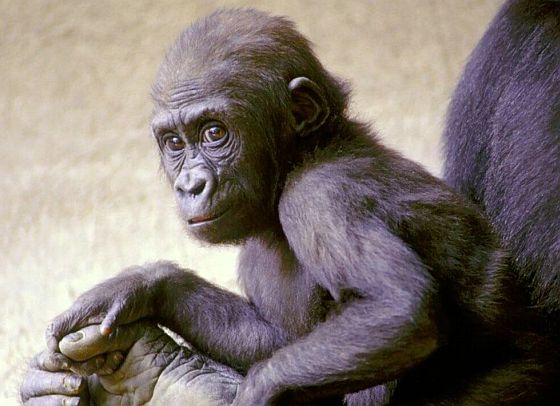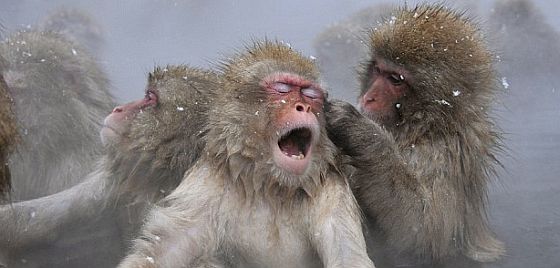
Stephen T Asma visited the slopes of the Mount Bisoke volcano in the Congo, where gorilla families roam, and the Serengeti, where he witnessed crocodiles preying on wildebeest. He wanted to better understand the existential fears that shaped the lives of our early ancestors.
After you spend time with wild animals in the primal ecosystem where our big brains first grew, you have to chuckle a bit at the reigning view of the mind as a computer. Most cognitive scientists, from the logician Alan Turing to the psychologist James Lloyd McClelland, have been narrowly focused on linguistic thought, ignoring the whole embodied organism. They see the mind as a Boolean algebra binary system of 1 or 0, ‘on’ or ‘off’. This has been methodologically useful, and certainly productive for the artifical intelligence we use in our digital technology, but it merely mimics the biological mind. Computer ‘intelligence’ might be impressive, but it is an impersonation of biological intelligence. The ‘wet’ biological mind is embodied in the squishy, organic machinery of our emotional systems — where action-patterns are triggered when chemical cascades cross volumetric tipping points.
Neuroscience has begun to correct the computational model by showing how our rational, linguistic mind depends on the ancient limbic brain, where emotions hold sway and social skills dominate. In fact, the cognitive mind works only when emotions preferentially tilt our deliberations. The neuroscientist Antonio Damasio worked with patients who had damage in the communication system between the cognitive and emotional brain. The subjects could compute all the informational aspects of a decision in detail, but they couldn’t actually commit to anything. Without clear limbic values (that is, feelings), Damasio’s patients couldn’t decide their own social calendars, prioritise jobs at work, or even make decisions in their own best interest. Our rational mind is truly embodied, and without this emotional embodiment we have no preferences. In order for our minds to go beyond syntax to semantics, we need feelings. And our ancestral minds were rich in feelings before they were adept in computations.

Recognizing the primacy of feeling in human evolutionary development and that the limbic system evolved long before the arrival of hominids, it would seem hard to dispute that other animals also have feelings. Even so, science has been slow to embrace this idea. Asma attributes this to the lingering effects of behaviorism, but I would trace it back to the Bible.
The Enlightenment might have elevated reason high above religious dogma, yet it expanded rather than closed the apparent separation between Man and Nature and in so doing, perpetuated rather than rejected the Biblical ideology that promotes belief in the uniqueness of human beings. Even if, thanks to Darwin, we could see ourselves as primates, our defining attribute — language — set us apart from all other species.
Even now, we view feelings as a higher faculty and on that basis speculate about how far back they go.
Did emotions really begin to appear with the birth of mammals? Presumably dinosaurs would have had fear and aggression; these useful affects might be distributed throughout the vertebrate clade. But did they ‘care’ about their young, like mammals do? Did they bond? No one really knows for sure. Scientists try to solve some of these deep-time questions by looking at contemporary reptile brains and behaviors. Most reptiles don’t require parenting: just overproduce your eggs, fertilise, and walk away. Reptiles never evolved care because they didn’t need it. But they did need ‘fight or flight’ and of course they have it: it’s located in the lower, older part of the brain, unlike mammalian care, which is in the higher limbic.
The problem with thinking about feeling in this way is that it turns particular feelings into kinds of species, some, all or none of which, might be found to inhabit a particular creature. It doesn’t strip feeling down to its core.
Feeling is the motor of life that makes us advance and recoil and what we can observe as physical motion in others we experience as attraction and aversion in ourselves. These are visceral reactions out of which complex feelings emerge and onto which we can impute all sorts of qualities, yet under each particular human feeling, such as hope or despair, there is some kind of movement with a physical expression. The movement might only take place on the face or through breath or muscle tension, but in some way the body moves.
Looking then at feeling as this lifelong motion driving us down certain pathways and away from others, this seems to be an attribute of all creatures down to the tiniest microbe.


The modular growth of neuronal circuits assumes a lot less than the genetic aberrations that could lead to a change in an established circuit so as to produce novel processing “systems.” Worthy of note is Dumont’s (a theory publishe in SCIENCE while he was a medical student: no circuit of neurons is removed, it is only reworked by interneurons. Like all grand theories, that too faded. So we must recall that Darwin spoke of RANDOM changes and temporal SELECTIVELY doing the rest. Emotions, therefore, could well have been EMERGENT traits that were selected because they activated and inhibited before the lessons of eating or be eaten were dully served before the lesson was learned too late in a fatal one trial lesson. To attribute purpose to emotions is, therefore, really to select out an illusory impressionistic part of an integrated whole and to idieate about it. In the old days, for example, we imposed all sorts of Sherringtonian reflex hierarchies on neuronal circuits that made so much sense and were so data proven. And yet, the more we learn, the less we know. Theories of the mind are like eating a slice of wedding cake: it tastes so good but totally wrecks the beauty of the whole, that slice only to come out as s–t!
When one looks at humans now, after all the “advances” and how much we have altered the world to suit us, we still see constant war and notice how rarely rational decisions are taken to solve what an independent observer, should such exist, would describe as important problems. It seems that something other than rational thought leads to most of our decisions, and feelings/emotions are hugely influential.
The uniqueness of man is hardly a behaviorist concept: if it’s something, it’s indeed Judeo-Christian, as Paul says. Asma’s piece is a sorry mess. How does he know that lions are not reasoning? His comment begs the question, since he never defines reasoning. What he has in mind presumably is that lions don’t seem to engage in human-like language based inference — if so, he is merely stating the fact that non-humans act as non-humans, a fact of impressive depth. So what’s he’s saying is either a truism or it’s entirely unproven. Second, his distinction between computational models and the rest is wrong. Turing’s universality implies that even the wettest kind of biology has a computational interpretation. Maybe he wanted to say that Chomsky’s grammar hierarchies are not up to the task. If so, that’s what he should have said.
@rosemerry: Lions are probably guided by innate feelings and emotions even more so than we are. Yet they are much more rational than we are. (I am not aware they kill antelopes just “because they can.”) Clearly our unique capacity for fucking things up has to involve both emotions and discourse.
–
ha
as i’m reading this i hear a song i like
begin to play on the radio
i started to grin and thought this over
i just felt something + i reached for the volume
you know i turned it up and enjoyed it more
sometimes it’s a pinball ride
sometimes nothing moves, ever
–
still believe the heart feels
the mind then reflects and acts
–
That such a conversation about our primate ancestors is necessary to correct our assumptions about reason and emotion speaks to the stubbornness of our preference for binary thought–i.e., reason/emotion. Reason and emotion are merely human-invented linguistic categories for understanding our mental lives, but they are inadequate. We need to stop using them as if they perfectly mapped onto reality.